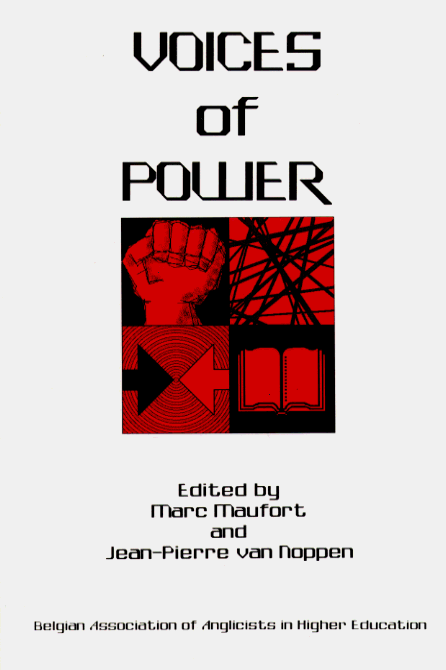|
The papers in this collection were presented at the international conference of the Belgian Association of Anglicists in Higher Education on Power, Co-Operation and Conflict in English Language and Literatures. They seek to highlight the use of language as an instrument of power in interpersonal, social, institutional, vocational, political, etc. as well as literary contexts.
Language, as a social activity, operates within the intricate network of power relations
that structure the social realm. Optimistic and moralistic accounts represent language
as an essentially cooperative activity. From a critical perspective, however, linguistic
interaction may be viewed as a process in which a language user’s choices not only
reflect, but actually shape, implement and enforce patterns of inequality and dominance
which may in turn foster tension and conflict.
In literature, the concept of power can be linked with the lack of a centre in postmodern
culture as the eurocentric, hegemonic vision of the world is superseded by an increasing emphasis on minorities, marginalised or repressed cultures; but it may also manifest itself at other levels, e.g. in the power of performance, in scenic language or in the staging process.
Contents
- Preface and Acknowledgments
- Jean-Pierre VAN NOPPEN: Power, Cooperation and Conflict in the English Language
- Michael STUBBS: Constructing a Dictionary of Cultural Keywords
- Srikant SARANGI and Stef SLEMBROUCK: Cooperative Rationality
in Public Discourse: The Case of Welfare Leaflets and Citizen Charters
- Vimala HERMAN: Misunderstanding and Power: Contests of Understandings
- Franca BELLARSI: William S. Burroughs’s Art: The Search for a Language
That Counters Power
- Sandra HARRIS: Strategic Discourse: Power, Cooperation and Conflict
- Richard TUFFS: Patterns of Power in Business Meetings
- Frank BOERS: Health, Fitness and Mobility in a Free Market Ideology
- Isabelle KNOTT: The Function and Implications of Metaphor in
British “Quality” and “Popular” Dailies
- Raymond LURIE: Language, Conflict and Power in the Trial Scene
of Webster’s White Devil
- Marc MAUFORT: Power and the Literary Text
- In Memoriam Betty Jean Jones
- Patrick PARRINDER: Textual Monopolies and the Public Domain:
Modern English Literature and European Copyright
- Marysa DEMOOR: Power in Petticoats: Augusta Webster’s Poetry,
Political Pamphlets, and Poetry Reviews
- Chantal ZABUS: The Power of Sycorax: Gynocracy in Gloria Naylor’s
Mama Day and Marina Warner’s Indigo
- Harry J. ELAM, Jr.: “Only in America”: Contemporary American Theater
and the Power of Performance
- Betty Jean JONES: Adrienne Kennedy’s Dramatic Realism: Power and
the Concept of Being in the American Drama
- Marc MAUFORT: “A Rustle of Wind Blowing across Two Continents”:
August Wilson’s Magic Realism as Expression of Empowerment
- Geoffrey PITCHER: The Readerly Ruse: Paul Laurence Dunbar’s
Dialect Poetry and the Aesthetics of Authenticity
- Christophe DEN TANDT: Vitalism and Control: Frank Norris’s and
Jack London’s Urban Sociology
- Jan WALRAVENS: Positions of Power in the Funhouse of Form:
Sabbatical as a Key (in)to John Barth’s Fiction
- Diana BRYDON: One Poem Town? Contemporary Canadian Cultural Debates
- Contributors
|
